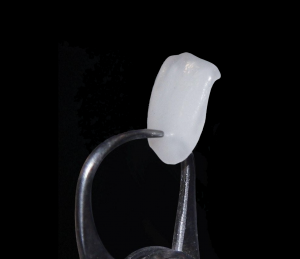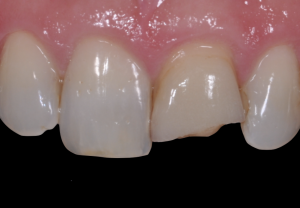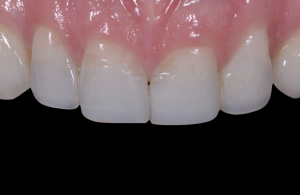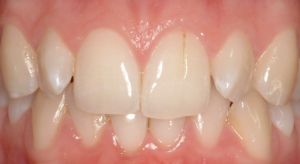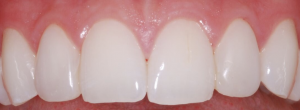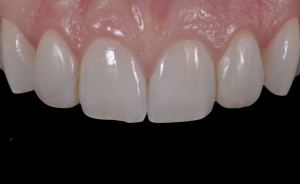
"How long do veneers last?" - it's the question every patient wants to know.
Veneers can last many years when planned and done well. Dr Andrea Shepperson explains...
The decision to invest in veneers is an important one and involves a significant investment for most patients. You’ll want to know that your investment is going to look good, and also perform well over many years. How long do veneers last, and what determines their success?
What is A Veneer?
A veneer is a thin shell of porcelain or composite filling material bonded to tooth enamel. Veneers change the shape, length, colour, position and surface texture of teeth.
Enamel is a strong coating on the surface of a tooth which can we treated with an acid gel to roughen it microscopically. Special resin glues or bonding agents will bind to the roughened surface and create a very strong bond. This allows a dentist to glue on a porcelain veneer or tooth coloured filling to create changes in shape, position, length and make minor colour changes. The longevity of veneers is excellent when they are bonded entirely to enamel, lasting up to 20 years or more in the case of strong porcelain veneers, or 7-10 years in the case of composite veneers.
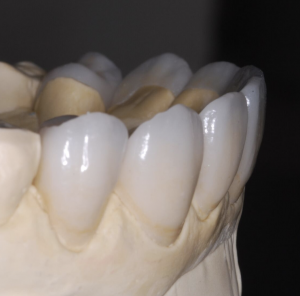
Beautiful custom designed veneers on a model. These are porcelain veneers made by a dental ceramist.
How Long Will A Porcelain Veneer Last?
A porcelain veneer is a very strong, beautiful and lifelike restoration that will last many years. The margin of a veneer is placed on enamel with a very tight seal. In the front of the mouth it is unusual to see decay at these sites in a well cared for mouth. We have patients with veneers that are nearly 25 years old. The porcelain (ceramic) material is very hard, smooth and durable. It does not stain, lose its colour and is stronger than a composite resin veneer.
A veneer can need replacement for a number of reasons:
- Gums can recede over time, showing the margin between the veneer and the tooth root. This can stain slightly over the years. In a patient who shows their gumline this can create a fine brown line.
- Veneers can chip and break after many years as the ceramic weakens with wear and tear and daily use.
- Veneers will break if the bite changes significantly through tooth loss, acid erosion or decay in teeth.
Here are some examples of older porcelain veneers:
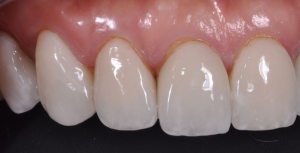
Slight staining and gum recession around 18 year old veneers done by Dr Shepperson for one of her patients.
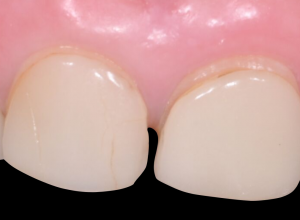
Staining and recession around bulky poorly shaped veneers that were 14 years old. Cracks are starting to form. These veneers needed re-design and replacement.
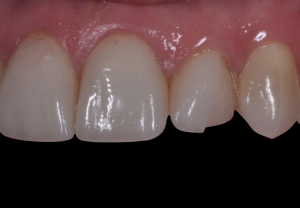
Broken veneer due to bite interference. Bottom teeth were realigned to improve forces on the veneer during chewing.
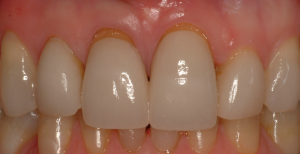
These veneers were done by Dr Shepperson in 1989. They are now 29 years old, with some gum recession which is not visible in the smile.
How Long Will A Composite Veneer Last?
A composite veneer is a tooth coloured filling material bonded to tooth structure. They can be used with virtually no tooth preparation, making them conservative and a cost effective option. They are placed in a single visit, based on a digital design or waxed design. The result is immediate. Composite resin veneers are more liable to wear and tear – staining, chipping, pitting and discolouration – and will not be as durable as a porcelain veneer.
Composite veneers will last 7-10 years and over this time may need some touchup work. Expect to spend a little on maintenance of composite veneers. Here are some examples of composite veneers as they age:
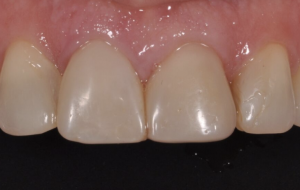
These composite resin veneers are 7 years old. They are starting to stain and pit and our patient wanted a more durable option.
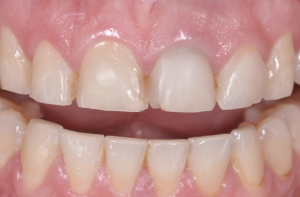
This composite veneer was trying to mask a grey tooth. The bite was flat and the patient was grinding their teeth. Composite was not strong enough to withstand bite forces.
Will I Need To Replace My Veneers?
Yes, it is highly likely your veneers will need to be replaced at some stage over your lifetime, especially if you start at a young age with veneers. When it is time to replace them they are polished off by your dentist, re-prepared and redone. Each time they are replaced a small amount of enamel will be removed and sometimes old veneers may need to be replaced with crowns if there is less enamel left.
Are Veneers The Best Option?
Veneers can be life-changing for patients and, done in experienced hands, will last a long time.
Careful planning and good design is critical to the success of veneers. Most of all a dentist needs enamel to bond to, to allow veneers to be glued onto teeth. If there is inadequate enamel through tooth wear or acid erosion, a veneer will not be as strong, and may be liable to debond or break.
Every case needs careful assessment and a dentist skilled in veneers will do a through assessment of:
- How much enamel is left to bond to. If there is not enough then a crown (360 degree cover) may be a better option.
- The amount of tooth repositioning needed. If big changes in position are required then some minor orthodontic repositioning may be needed first. Sometimes, if a beautiful smile can be achieved with orthodontics such as Invisalign, then veneers are not needed at all.
- The underlying colour of the tooth. Very dark, black or grey discoloured teeth are hard to mask with veneers. These are better managed with crowns.
- Your bite and whether it needs correcting before veneers are placed. The way you use your teeth is critical to the success of veneers. Choose a dentist who really knows how to assess your bite properly, to make sure it is not going to compromise your veneers or need correction before veneers are done.
- Your age and the impact of removing enamel. If teeth are already damaged through tooth wear, old fillings, acid erosion then a dentist will generally recommend porcelain veneers, or crowns. If you are young and your teeth are beautiful with perfect enamel, a dentist may recommend Invisalign or minimal preparation composite veneers. This allows enamel to be preserved.
Who Should Do My Veneers?
Choose a dentist with experience, to be assured that they will assess and design your case considering the best solution for you. The design and planning of your veneers will make a big difference to how long your veneers will last. Ask your dentist to show you cases of their own success and how they managed the failure of poorly done veneers. A good dentist will be happy to share outcomes with you.
In our office we use Digital Smile Design, a 3D planning technique to assess and design a case. Part of our assessment is to evaluate the bite forces that impact your case and we are very experienced in this field. Dr Shepperson is New Zealand’s only Digital Smile Design Master and Instructor and much of her work involves correcting worn bites before doing veneers, as well as straightforward cosmetic improvements. Her team is trained to spot red flags before starting treatment.
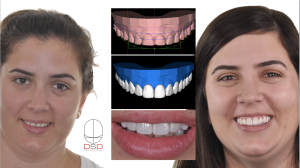
Dr Shepperson replaced old composite veneers and corrected a worn bite with new porcelain veneers and crowns. Our beautiful patient now has a durable solution that corrected shape, colour, tooth wear and a damaging bite.
Read more about this case here.
Above all, the practice is focused on preserving enamel and delivering conservative solutions with your health and beauty in mind.
How Can I Look After My Veneers?
Here are some tips for caring for your veneers:
- Don’t use your teeth as tools. Even habits like nail biting can put huge forces on veneers and cause them to break. Other habits such as biting fishing line, sewing thread, opening bottles or plastic seals can damage veneers.
- If you are grinding your teeth, have your dentist make you a protective splint. These are mostly used at night-time.
- Moderate your quantity of staining drinks, such as tea and coffee.
- Visit a hygienist regularly and really look after your gums well. Floss daily and use a soft brush or electric toothbrush head. Try to avoid gum recession and exposed veneer margins as a consequence.
- Use a low abrasion formula toothpaste. Commercial brands often have larger particles that can scratch veneers. Ask your dentist or hygienist for recommendations.
- Moderate your acid intake – no lemon juice in water, soft drinks or vinegar diets – they can dissolve teeth that support veneers and cause some damage to composites over time.
Want To Know More or Ask Us A Question?
Click here to touch base with the team at Lumino City Dental at Quay Park, or send us a photo of your smile to info@citydental.co.nz.



